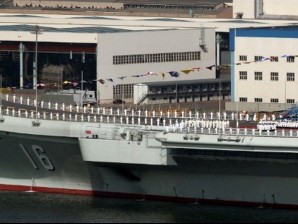China leads rise in Asia military spending—study

China’s first aircraft carrier, the “Liaoning” sits berthed at the naval base in Dalian, northeast China’s Liaoning province. China’s first aircraft carrier, a former Soviet ship it bought from Ukraine and refurbished, entered service on September 25, the defence ministry in Beijing said. AFP
WASHINGTON—Military spending by Asia’s major powers increased dramatically over the past decade with China leading the way, as its defense budget quadrupled since 2000, according to a study released Monday.
Defense spending in China and four other Asian countries doubled over 10 years and will surpass Europe’s military expenditures this year, said the Center for Strategic and International Studies, a Washington-based think tank.
Asia’s arms race still leaves it trailing US defense spending, but it will ensure the United States likely will stick to its plan to shift the country’s strategic focus towards the Asia-Pacific region, it said.
Defense spending in China, India, South Korea and Taiwan reached a total of $224 billion in 2011, which “equates to almost twice the amount spent by these five countries in 2000,” said the CSIS study.
“With Asian defense spending projected to overtake that of Europe by the end of 2012, the United States’ posture rebalancing toward the Asia-Pacific region is likely to continue,” it said.
Article continues after this advertisementIn 2005, China’s military budget outstripped Japan’s as the largest in Asia and recorded a 13.4 percent annual rise that year.
Article continues after this advertisementAmong all countries, China now ranks second behind the United States in total military spending, though the Pentagon budget still dwarfs Beijing’s defense spending at more than $600 billion (463 million euros) year.
Experts say China’s emergence as a global economic giant has driven the spike in military spending, as Beijing seeks to assert its influence beyond its borders to safeguard its access to sea lanes and resources.
In 2011, Beijing spent $25.8 billion on new weapons and related research and development, up from $7.3 billion in 2000, the report said.
China’s total defense budget grew from $22.5 billion to $89.9 billion between 2000 and 2011, said the report, citing official figures from the Beijing government.
But the study acknowledged that independent estimates put Chinese spending at a much higher level, with the Stockholm International Peace Research Institute estimating Beijing’s 2011 defense budget at $142.2 billion.
India’s defense spending grew 47.6 percent over the decade, reaching $37 billion in 2011. Japan’s military budget rose from $40 to $58.2 billion.
South Korea’s defense investments swelled from $17 to $29 billion, while Taiwan’s defense budget expanded at a slower pace, from $8 billion in 2000 to $10 billion in 2011.
Apart from Japan, which spent $238,000 per soldier in 2011, the four other countries devoted $28,000 to $44,000 to training, paying and equipping each of its soldiers, the study said.
“This discrepancy was predominantly caused by the small size of the Japanese forces, approximately 244,300 troops in 2011, relative to the other countries,” it said.